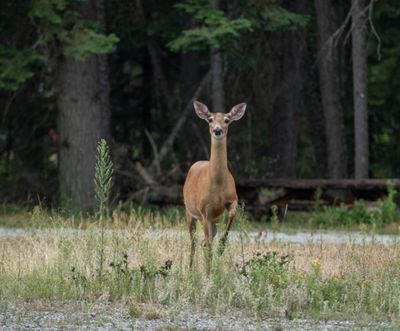Washington lines out emergency rules for CWD

Washington officials have signed off on a suite of emergency rules meant to stem the spread of chronic wasting disease, including mandatory testing in three hunting districts and transport restrictions for dead animals.
The Washington Department of Fish and Wildlife announced the rules Friday morning, a little more than three weeks after the state confirmed its first case of the always-fatal disease in a white-tail deer in north Spokane.
The new rules require CWD testing for any deer or elk killed by hunters or salvaged in game management units 124, 127 and 130, a broad area surrounding the spot where the CWD positive deer was found. They also prohibit the use of bait for hunting in those units.
They also prohibit moving dead animal parts from most of Eastern Washington to other parts of the state, with the exception of deboned meat.
Increased testing is meant to help the agency better understand the outbreak and the transport and bait rules are designed to limit its spread.
The rules are WDFW’s first major step toward dealing with the condition, which affects deer, elk and moose. Though they are temporary, the agency said in a news release that it plans to propose permanent rules for approval by the Washington Fish and Wildlife Commission.
Agency officials wrote in the release that it’s “important to prevent a widespread outbreak of CWD in Washington to protect wildlfie populations.”
CWD has been found in 35 states and five Canadian provinces. Shortly after Washington announced its first case in early August, Idaho announced that the disease had been found for the first time in the Bonners Ferry area.
The disease is caused when microscopic proteins called prions become deformed. Infected animals shed the prions through bodily fluids, and they’re easily picked up by other animals through direct contact.
Once in a healthy animal, the misfolded prions cause other prions to malfunction, and the disease progresses and ultimately attacks an animal’s nervous system. Symptoms don’t normally show until the late stages of the disease, but infected animals can become emaciated and show erratic behavior.
The disease is not known to affect humans, although health officials advise against eating meat from infected animals. It is known to have major impacts on wildlife populations when left unchecked.
There’s no cure, so all wildlife officials can do is try to determine the scope of an outbreak and take steps to limit its spread.
WDFW announced that it had detected the disease on Aug. 1. The deer had been found dead in the Fairwood area of north Spokane in February.
Because of the way testing takes place at the Washington Animal Disease Diagnostic Lab in Pullman, the sample wasn’t tested until July.
Since the confirmation, WDFW officials have been meeting to determine their next steps.
Officials decided to mandate testing and ban baiting in the three units around Spokane – 124, 127 and 130. The deer was found in unit 124, and at least part of 127 and 130 are within 10 miles of where the deer was found.
Mandating testing is meant to help WDFW understand the scope of the outbreak better. Officials said in a news conference this month that they believe they’ve found the disease early, but more testing is needed to confirm that.
Successful hunters and those who salvage animals will need to submit the head of their animal with 3 inches of neck attached or lymph nodes taken from the base of the animal’s skull, according to a news release.
WDFW has instructions online for those who want to gather their own samples, and the agency also collects samples by appointment at its offices.
Banning hunting over bait is meant to limit the possibility that large numbers of deer or elk will congregate in a small space, which would make it easy for CWD to spread. The ban only applies to those three units, and the practice will still be allowed in other hunting districts in the state.
Staci Lehman, a WDFW spokesperson, said there have been discussions about banning hunting over bait in the past for numerous reasons, and that it’s a conversation WDFW is “definitely interested in having.”
The transport restrictions will apply to all game management units in WDFW’s eastern region, which covers 10 counties.
All successful big game hunters in units in the 100s will have to debone their meat within the region before taking it elsewhere.
Josh Wilund, the co-chair of the Washington chapter of Backcountry Hunters and Anglers, said in a statement that the group is in full support of WDFW’s new rules.
“We recognize emergency rules tend to create concern and some hunters may feel the changes produce inconveniences or require additional sacrifice,” Wilund said. “However, the agency is moving rapidly to handle a serious and always-fatal disease affecting cervids, including taking steps to make testing more convenient.”
Wilund added that the management of CWD in Washington “should not be a hot potato issue,” and that hunters and others who care about wildlife should get involved.
“It’s our turn to step up,” Wilund said.